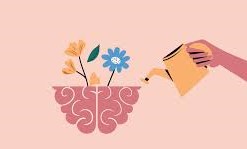Grief is a profound and complex emotional experience that can affect our mental, emotional, and physical well-being. It arises from loss, whether due to the death of a loved one, the end of a relationship, or other significant life changes. In Ayurveda, grief is viewed not just as an emotional response but as a disturbance in the body’s natural balance. This ancient healing system offers various tools and practices to help individuals navigate their grief journey, promote healing, and restore harmony within themselves.
Understanding Grief Through an Ayurvedic Lens
In Ayurveda, the body is composed of three doshas: Vata, Pitta, and Kapha. Each dosha represents different elements and qualities, influencing our physical and emotional states. Grief often manifests as an imbalance in these doshas, particularly in Vata and Kapha:
- Vata Dosha: Associated with movement, change, and creativity, Vata is often linked to the air and ether elements. When grief occurs, Vata can become aggravated, leading to feelings of anxiety, restlessness, insomnia, and a sense of disconnection from reality. Individuals may experience rapid thoughts and difficulty focusing.
- Kapha Dosha: Representing stability and structure, Kapha is linked to the earth and water elements. During grief, an excess of Kapha can manifest as feelings of heaviness, lethargy, withdrawal, and depression. Individuals may find themselves isolating from others or feeling a sense of stagnation.
Recognizing how grief affects your dosha is crucial for initiating healing practices tailored to restore balance.
Ayurvedic Practices for Healing Grief
1. Dietary Adjustments
Eating nourishing foods is essential in managing grief in Ayurveda as it helps restore balance. To support emotional well-being during grief, focus on warm, comforting meals that are easy to digest. For further insights into Ayurvedic dietary practices, consider visiting the Ayurvedic Institute. Here are some dietary suggestions:
- Kitchari: This traditional Ayurvedic dish, made of rice and lentils, is considered nourishing and grounding. It provides essential proteins and carbohydrates while being easy on the digestive system. Adding spices like turmeric and ginger can enhance its healing properties.
- Herbal Teas: Incorporate calming herbal teas into your daily routine. Options like ginger, chamomile, and tulsi can help soothe the mind and promote relaxation. For instance, tulsi is known for its adaptogenic properties, helping the body manage stress and anxiety.
- Whole Foods: Focus on consuming fresh fruits and vegetables, whole grains, nuts, and seeds. Foods rich in omega-3 fatty acids, such as flaxseeds and walnuts, can support brain health and emotional well-being. Avoid processed foods, excessive sugar, and caffeine, which can aggravate anxiety and mood swings.
2. Daily Routine (Dinacharya)
Establishing a daily routine based on the principles of grief and Ayurveda can create stability during turbulent times. Following Ayurvedic principles, consider these practices:
- Morning Start: Begin your day with mindfulness practices such as meditation or gentle yoga. A few minutes of deep breathing or sun salutation can ground you and set a positive tone for the day.
- Mindful Eating: Pay attention to your meals. Eating slowly and mindfully helps you connect with your food and fosters gratitude, promoting emotional stability.
- Sleep Hygiene: Ensure you have a consistent sleep schedule. Create a calming bedtime routine, which may include dimming the lights, reading, or practicing relaxation techniques to prepare your body for restful sleep.
3. Breathwork and Meditation
Pranayama (breath control) and meditation are powerful tools for managing grief. They help center the mind and body while fostering emotional release. Here are two effective techniques:
- Nadi Shodhana (Alternate Nostril Breathing): This technique balances the mind and calms Vata, reducing anxiety. To practice, sit comfortably, close your right nostril with your thumb, and inhale deeply through your left nostril. Close your left nostril with your ring finger, release your right nostril, and exhale through it. Inhale through the right nostril, close it, and exhale through the left. Repeat this cycle for several minutes.
4. Herbal Remedies
Several Ayurvedic herbs can support emotional healing and balance. Consider the following:
Learn more about herbs here.
- Ashwagandha: Known as an adaptogen, ashwagandha helps the body manage stress and anxiety. It can promote emotional stability and support overall well-being. You can take it in capsule form or as a powder mixed with warm milk.
- Brahmi: This herb is well-known for its cognitive-enhancing properties and its ability to calm the mind. Brahmi can be taken as a tea or in capsule form to support mental clarity and emotional balance.
- Turmeric: With its anti-inflammatory properties, turmeric can support overall wellness. Adding turmeric to your meals or taking it as a supplement can enhance your physical and emotional health.
Before starting any new herbal regimen, consult with an Ayurvedic practitioner to ensure the right approach for your individual needs.
5. Physical Movement
Engaging in gentle physical activities can promote the flow of energy (prana) and help release emotional tension stored in the body. Consider incorporating the following:
- Yoga: Gentle yoga practices can help calm the mind and body. Poses like Child’s Pose (Balasana) promote introspection and relaxation, while Cobra Pose (Bhujangasana) opens the heart and encourages emotional release.
- Walking in Nature: Spending time outdoors can have a profound effect on mental health. The sights, sounds, and scents of nature can uplift your mood and help you process emotions more freely.
6. Community and Support
Grief can feel isolating, but connecting with others can be healing. Reach out to friends, family, or support groups to share your feelings and experiences. Engaging in community activities or joining a grief support group can foster a sense of belonging and understanding, which is crucial during challenging times.
7. Journaling
Writing about your feelings can be therapeutic. Journaling allows you to express emotions, reflect on memories, and process your grief. Here are a few prompts to get started:
- “What do I miss the most about my loved one?”
- “What brings me comfort right now?”
- “What are some positive memories I cherish?”
Regular journaling can help you track your emotional progress and provide clarity during difficult times.
Conclusion
Navigating grief is a deeply personal journey, and Ayurveda offers a holistic framework to support healing. By embracing Ayurvedic practices, individuals can find balance, nourishment, and emotional support during this challenging time. Healing is not linear; it takes time, and it’s essential to be gentle with yourself. Remember, it’s okay to seek professional help if needed. With the right tools and support, it is possible to move through grief toward a place of peace and acceptance.



